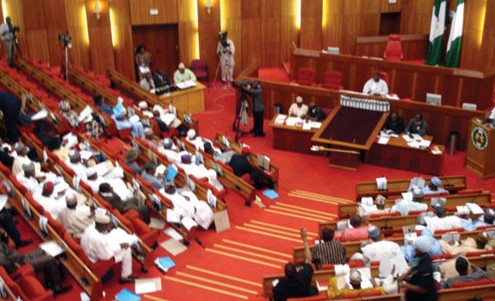 The Minister of State for Industry, Trade and Investment, Hajiya Aisha Abubakar, said the cumulative value of textiles and garments imported or smuggled into the country annually was estimated at 4.2 billion dollars.
The Minister of State for Industry, Trade and Investment, Hajiya Aisha Abubakar, said the cumulative value of textiles and garments imported or smuggled into the country annually was estimated at 4.2 billion dollars.
Abubakar disclosed this at the High Level Stakeholders Retreat on Cotton, Textiles and Garments (CTG)’s policy in Abuja on Thursday.
She said that 329 million dollars worth of revenue was lost to importation and smuggling of textiles and garments per annum.
She said that the administration of President Muhammadu Buhari was committed and determined to revive textile industries.
The Minister explained that cotton, textiles and garments sector was one of the key sectors priortised in the Economic Recovery and Growth Plan and Economic Industrial Revolution Programme of the government because of its importance to employment generation and wealth creation.
According to her, the sector policy review is in tandem with Nigeria’s industrialisation and diversification initiatives of the government to invest in agriculture and manufacturing sector which are expected to be the major contributors to the economic growth and development.
Abubakar stated that the stakeholders should be instrumental to the implementation of the CTG sector toward enhancing productivity through access to credits and inputs as well as capacity building for the entire industry.
“Our vision for this industry is to create direct employment for about one million people by year 2023.
“We also want to achieve self-sufficiency and contribute 20 per cent share in Nigeria’s total export earnings with textile and garment exports targeted to reach two billion dollars by year 2025.
“It is our plan to achieve 15 per cent of national industrial production and 18 per cent market share in the global textiles and garments market and hope to contribute 5.5 per cent to the country’s GDP by year 2023,” he said.
The minister said that it was part of the plans to develop a modern integrated textile and garments industry focusing on local demand and export for the upper segment of the world market thereby making Nigeria one of the leading players in global textile and garment industry.
In his remarks, Mr Edet Akpan, the Permanent Secretary in the Ministry, said CTG policy framework had over time required an evaluation in response to unresolved challenges facing the stakeholders.
Akpan explained that the challenges were high cost of production, smuggling and counterfeiting of textiles and garment products; very low demand for cotton domestic textile mills, tax concessions and waivers.
According to him, other problems are poor patronage of local textile and apparels, lack of power supply and insufficient production of cotton seed.
He said that the stakeholders for the retreat were expected to provide expertise and recommend sustainable approach toward addressing these challenges.











